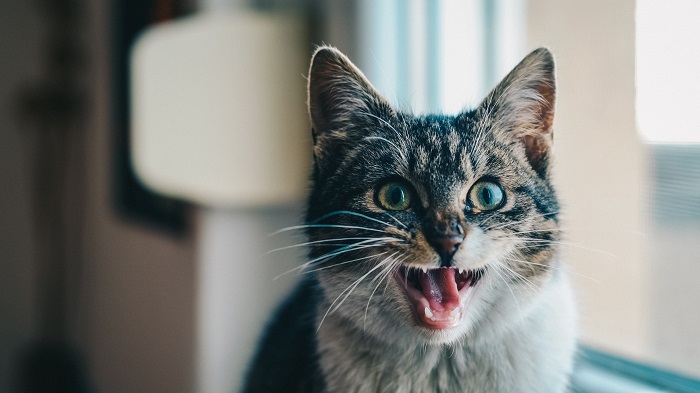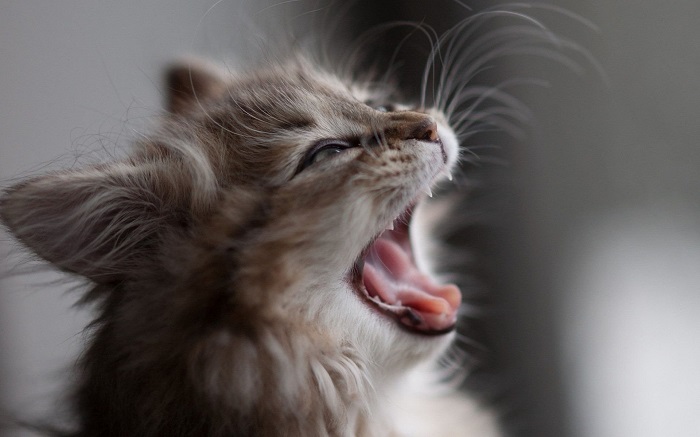Charles Dickens loved cats a lot. He gave a famous quote on cats “What greater gift than the love of a cat“. But what if cat’s lovely meow turns into a horrendous scream? Have you ever been startled by the ear crackling noise of the cat scream? If you want to know about the cat screaming, the reasons behind it, and ways to deal with it, then hurray! We’ve got amazing stuff for you.

What is Cat Screaming?
Cats can make ten times more sounds than dogs. Don’t be under a myth that only exotic species of cats scream. Do you know that cats can make a hundred vocal sounds? Cat scream is also one of the hundred vocal sounds made by cats, however, it is fairly uncommon.
Cat scream is not only eerie but also undoubtedly unique i.e. has a less chance of getting mistaken. Generally, you will hear a cat screaming at night. It is because scientifically explaining, cats are crepuscular, meaning they are relatively more active around dusk and dawn.
Read Also:
This time includes early and late hours with absolutely little natural light. This odd timing makes the sound more irritable and shocking. Imagine you hear a gong at midnight! This sound can be expected or sudden and its intensity can also vary making it more pathetic. However, this screaming sound is used by cats to pass on an extensive range of emotions.
What Does Cat Screaming Sound Like?
So, for those who have never heard a cat screaming, it is nerve-racking and daunting. If you are sitting in a quiet space then an unexpected cat scream might make you jump out of the chair with shock.

The cat might scream to grab your attention but it can make you miss a beat! Hearing it for the first time might scare the owner out of his/her wits. In a nutshell, it is gut-wrenching, piercing, and ear-splitting.
From the looks, the cat might look like a soft and decent creature but their wild side is ought not to be undermined. Depending on the intensity and duration the Scream can leave the person stunned to completely flabbergasted. One may compare it to that of humans, but it is more urgent rather and calls for immediate attention.
Which Cats Are More Likely To Scream?
Have you ever encountered the question like “why only my cat Screams, while others’ stay calm?” Are your flatmates pissed off from your cat and happy with theirs? This is because some cats are more likely to scream than other cats. Just like humans, cats’ behavior is also determined by the way they are brought up.

If their upbringing was negligent, with little care and more of aggression, they turn out to be aggressive too. Temperament and Environment are two important factors. If the cat is living in a packed environment where there is no personal space then they are more likely to scream frequently.
Also, constant efforts to prove their dominance over other cats, rough handling as a kitten by the owner, and the natural tendency of aggression might result in Vocalisation. During heat cycles, cats are more likely to lose control. They run around the house, scratch the walls and spray urine in aggression. It is all because of hormonal changes, as discussed above.
To get rid of this, nothing is better than spaying and neutering. The benefits of spaying outweigh the risk. It not only shields the owner from loud, untimed, and scratchy cat screams but also unwanted urine sprays on the walls. It is a healthy and safe method for cats to protect her from bearing more kittens and resultantly reducing more heat cycles and screams.
Why Do Cats Scream?
It is not unknown that cat screams are uncommon. It is her own way of communicating with people. Have you ever tried to figure out the reason behind their screaming? Has the process left you perplexed and nothing but you scratching your head? It is natural to give up easily because there could be multiple reasons behind this behavior of cats. So let’s gear up and look at the best possible explanations:

1. Fear
Is your cat scared of something? Remember that introducing cats to new family members, cucumbers (sort of!), and loud home appliances can send cats scampering. Most commonly, cats scream because of Fear.
On the other hand, cats also scream when they are angry. This anger could be the result of fear. However, other factors like the absence of climbing shelves (for her to climb over), scooting her away, and neglecting her might make her mad.
Screams can also come out while she’s engaged in catfights, making it a blend of fear and anger. Aggressive cats can make throaty growls. You should take this growling as a warning!
2. Illness
The illness affects the body and mind. Humans when are ill they feel lethargic and drained. Even they shout in pain during extreme illnesses. So why exclude cats? They scream when ill to convey their discomfort. Diseases like Feline Arthritis is very painful for cats.
Other diseases like Feline Leukaemia Virus and Feline Immunodeficiency Virus are also common in cats. These viruses can be extremely painful and can turn your cat into a screaming monster. Extreme pain and serious illness are a very important reason behind cat screaming and should not be ignored by the owner.
3. Distress
Cats also scream when they are distressed. It should be kept in mind that cats are not comfortable with sudden change. This change can be related to daily activities, the introduction of new family members, or might be a new item in your home. These changes can trigger distress in cats.
Have you ever exposed your cat to loud music? Even loud noise of music or home appliances can make your cat feel distressed. Some mild events like not able to search the favorite toy or not able to open a box can also act as a stressor for cats. Distress leads to aggression in cats which results in cat screaming.
4. Confusion
As humans age, they are at a high risk to be affected by Dementia. Because of this disease, people suffer from memory loss, find it difficult to perform everyday activities, and have serious effects on cognitive functions. Cats are no exceptions. They suffer from Feline Senile Dementia when they age.
One of the symptoms of Dementia in cats is vocalizing i.e. they meow loudly, especially at nights. Dementia causes confusion in cats and they become fearful of the environment. In frustration and disgust, they scream at the top of their voices (even humans scream in frustration!).
5. Hormones
Female cats can go through their heat cycles (estrous) from 4 to 12 months of age. When dogs undergo their heat cycles they typically show physical signs. However, unlike dogs, cats prefer to show more behavioral signs. During their heat cycles, they are ready to reproduce.
Vocalizing is a very common activity shown by cats in these times. They yowl, meow, or cry loudly and try to seek attention. They let other cats know that they are in heat through screaming. Also, during these times cats enjoy being loved and petted by their masters, especially at back and hindquarters.
This attention-seeking behavior of cats is quite irritating. Therefore, to reduce this behavior, spaying or neutering the cat is a good way. Otherwise, you should allow them to reproduce.
How to Deal With a Screaming Cat?
People want to get rid of a cat screaming but how? You can follow a few methods to control the problem, if not getting rid of it completely.

Firstly, figure out the reason behind the cat screaming. Sometimes it is easy to understand the reason, and sometimes you are left absolutely clueless. Feeling perplexed is better than ignoring the problem forever. A good owner never shows his/her back towards the duties. Also, ignoring the initial screamings might give a drastic turn to the situation.
Secondly, if you are not able to find the reason for screaming then take your cat to the vet. It is always a good way. The cat might scream because if infections or illness. Go for physical examinations to diagnose these problems. If you figure out the reason as discomfort then show no negligence and immediately take the vet’s appointment. In these times, your alertness counts. More delays would lead to more problems.
Thirdly, the cat might also scream because of fear. She might not be comfortable with something. As the owner, it is your responsibility to provide your cat with a comfortable space. Don’t introduce sudden changes, this might distress the cat. Try to give the cat, required space and comfort. You can do this through minor adjustments in the environment.
Fourthly, cats cannot help screaming during their heat cycles. For the owner, it is sickening to hear the cat scream every midnight. To get rid of this, obviously, spay or neuter the cat. It is a very healthy and effective way to the problem of screaming.
At last, don’t try to be the doctor! If you notice violent changes in the cat’s behavior, immediately take her to the vet. You can also seek advice from the cat behaviorist.
Read Also:
Final Words
Every cat owner wants his/her cat to behave normally every time. However, we should understand that unlike humans, cats cannot ‘speak’. Their only way to communicate with us is through behavioral signs. As humans go through periods when they are angry or might be frustrated, the same is with animals like cats. In hard times humans need just a touch of care and a warm hug.
Then why treating animals differently? Animals like cats crave your touch and warmth. All they want is love! Just like humans! So it’s our responsibility to treat them better and help them in their difficult times. Cat screaming is natural and by following the above methods, the maximum area of your problem would be solved. So at last, stay safe and LOVE CATS!
























